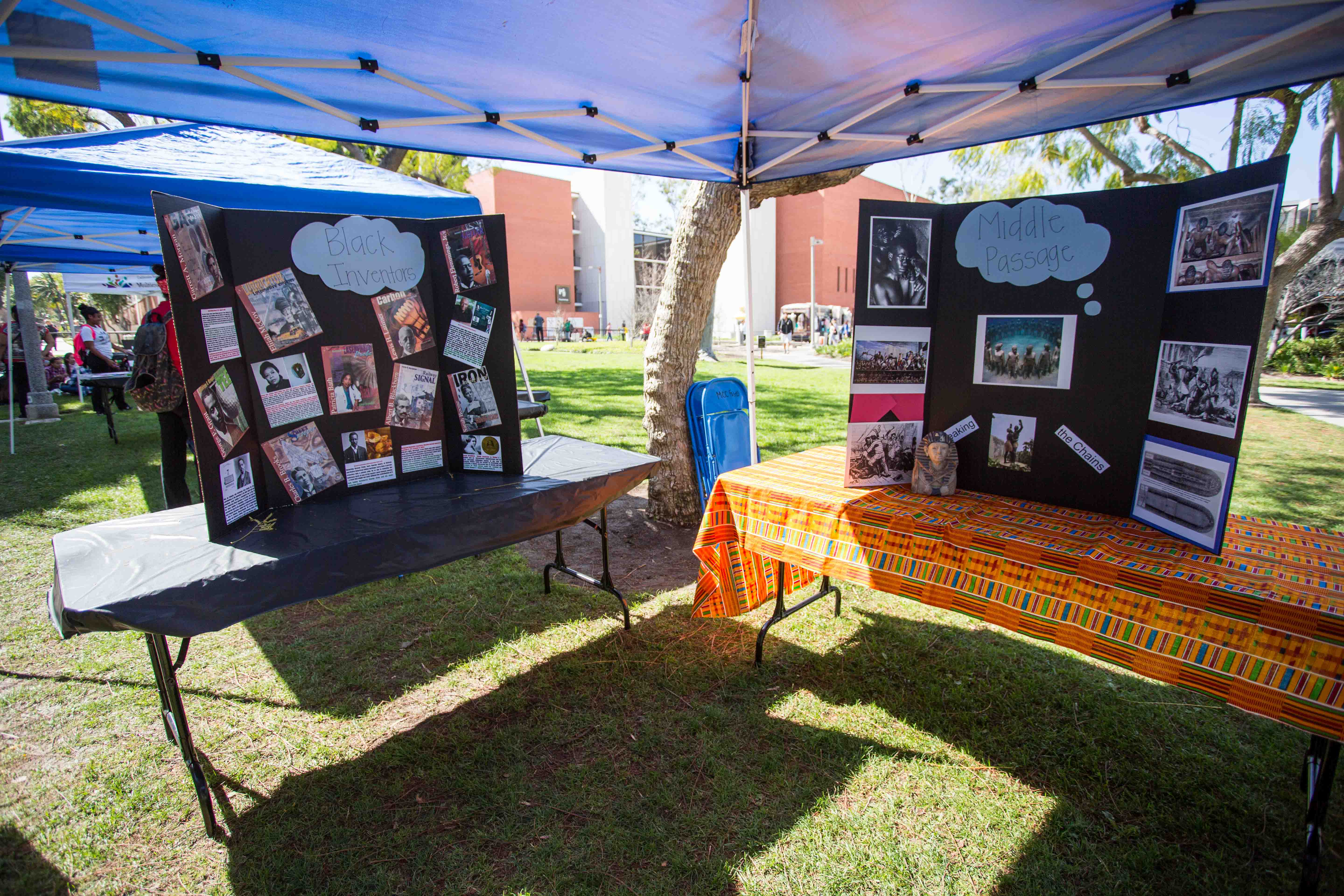Students took a walk through black history in the free speech lawn at Cal State Long Beach Thursday.
As a celebration of Black History Month, the Africana Studies Student Association, sponsored by the Multicultural Center, hosted the Black Experience, an event that simulated an outdoor museum.
“I feel like it’s [black history] something that we need to talk about and stop acting like it never happened,” said Xavier Rogers, president of the ASSA. “We can’t be color blind – we all have colors. It’s OK to talk about it, come together on it. It’s not bad to talk about your race and about your ethnicity.”
The timeline of black history presented by ASSA began in ancient Mali, traveling across the Atlantic through the Middle Passage, straight into 245 years of slavery and finally rising into power through invention and music.
The purpose of the Black Experience was to raise consciousness among students by sharing the best and worst of black experience in the United States and throughout the world.
Recent highlights in black excellence were performances by Beyonce and Kendrick Lamar.
Beyonce caused controversy at the 2016 Super Bowl with her new single “Formation,” which she released in a surprise video the day before. The performance included 50 black women in Black Panther inspired attire, complete with two bullet belts draped across Beyonce’s chest.
At the 58th Annual Grammy Awards, Kendrick Lamar performed in a prison uniform and shackles. He freestyled a spoken word poem about Trayvon Martin before singing his influential hit “Alright” from his 2015 album “To Pimp a Butterfly.”
In the ongoing black movement, both songs are anthems not unlike the “negro spirituals” sung in the slave era. However, Assistant Director of Multicultural Affairs Dr. Jonathan Higgins admits that the black movement is not without its flaws.
Higgins identifies as a feminist and social justice advocate. He believes that the performances of both artists are important and influential but the reception by the public has been problematic.
“I wish that the way [Beyonce’s] performance was heralded is the same way [Kendrick Lamar’s] performance was heralded,” Higgins said. “From the perspective as a person of color, how we herald the black man’s voice in our movement, particularly the Black Lives Matter movement, but yet we don’t really give the same weight and the same support to the voice of women in the movement.
“While I think his performance is important and necessary for our movement, my problem lied in the notion that male rappers have not been uplifting the experiences of black women throughout the issues we’re having.”
He also stressed the importance of intersectionality in the black community.
“If we’re going to talk about black issues and we’re going to talk about the problems that are in the black community we have to make sure that we’re talking about them from both lenses both male female, trans, black queer, whoever, and that’s why intersectionality is so important,” Higgins said.
The event encouraged unity and positive relationships between black people and others by embracing the past and present of black history.
“We’re seeing a really strong support network these days. I think people are starting to come together more,” said Higgins.
Larese Hubbard, a professor in the Africana Studies Department, took her Africana Womanism class to the Black Experience to provide them with an out-of-class learning experience.
She hoped the event would expose her to more black history, especially black women’s history. She encouraged her class to ask questions and learn new things. She said she has black students and others in her class and so she wanted to get them involved with other black students and black organizations on campus.
The timeline ended with a display of the current project ASSA is working on. At various high schools around Long Beach, ASSA has been mentoring kids and encouraging them to pursue higher education. The high schools include Woodrow Wilson Classical, Robert A. Millikan Senior and Long Beach Polytechnic.
This event is one of the various celebrations happening at CSULB in honor of Black History Month.
The Black History Month series began on Feb. 2 with a performance of African music in the University Student Union Southwest Terrace. This month’s Black History series addressed issues of same-sex relationships, women’s issues and history of the overall black experience.
This Tuesday, the Black History commemorations will come to a close with “No Happy Color.” The play was written by CSULB student Tahirih Moeller and will be performed at the Player’s Theater at 6:30 p.m. The play is about issues of racism as part of the black experience.




